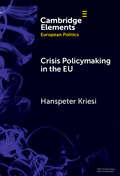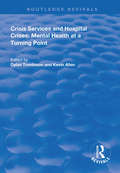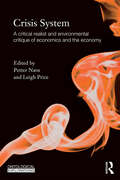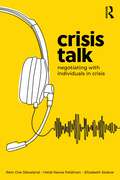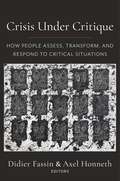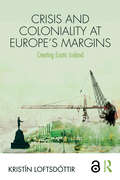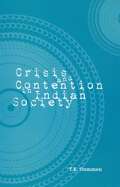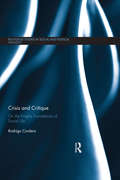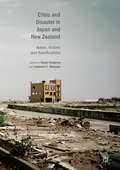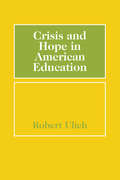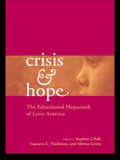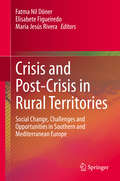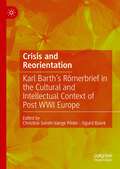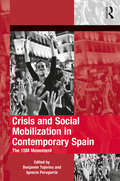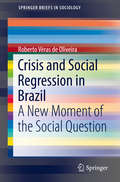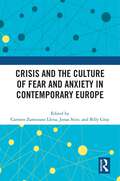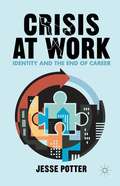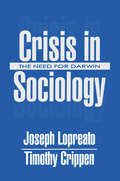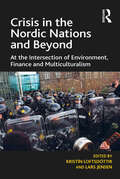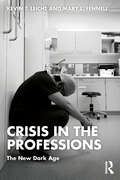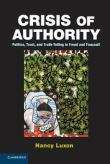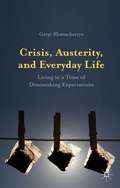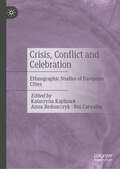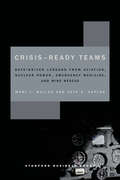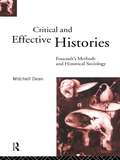- Table View
- List View
Crisis Policymaking in the EU: The COVID-19 Crisis and the Refugee Crisis 2015-16 Compared (Elements in European Politics)
by Hanspeter KriesiThis Element compares crisis-specific policymaking, its causes and consequences, at the two levels of the EU polity during the COVID-19 and the refugee crisis 2015–16. In both crises, EU policymaking responded to exogenous pressure and was dominated by executive decision-making. Still, it also differed in three critical aspects: it was much more salient, consensual, and effective during the COVID-19 than the refugee crisis. The present study accounts for both similarities and differences, which it attempts to explain by features of the nature of the crises. The key argument of the study is that the policymaking process during crises is, to a large extent, determined by the crisis situation – the crisis-specific functional problem pressure, the institutional context (of the EU polity), and the corresponding political pressure at the origin of a given crisis. This title is also available as Open Access on Cambridge Core.
Crisis Services and Hospital Crises: Mental Health at a Turning Point (Routledge Revivals)
by Kevin Allen Dylan TomlinsonFirst published in 1999. This text examines the impasse in the development of alternatives to hospitals, drawing on the experience of both crisis service users and providers, and evidence of the effectiveness of such services. The book concludes that crisis services are preferred by users, are usually more cost effective and often more clinically effective than acute admissions wards. It offers a number of policy suggestions to advance the role of crisis services, including monitoring, evaluation and development centres, or programmes being established on a national basis, and joint training between crisis service and hospitals.
Crisis System: A critical realist and environmental critique of economics and the economy
by Petter Næss and Leigh PriceThis book throws light onto the nature and causes of three different but strongly interconnected crises in contemporary societies worldwide: an economic crisis, an ecological crisis and a normative (moral and political) crisis. These crises are reflected in the profoundly inequitable distribution of wealth, resources and life opportunities around the world. If we follow the causal roots of these crises, we are led back to an inherent dynamic in the capitalist economic system itself, discursively expressed as neoclassical, mainstream economics. For instance, by conflating human needs with market demand, mainstream economics disregards the needs of those who do not have sufficient purchasing power, as well as any needs that cannot be quantified or monetised in some way. Mainstream economics also ignores the notion of natural limits. Furthermore, it seems that everything that is quantifiable is potentially for sale and this results in the substitution of nature, indigenous cultural traditions and various life forms with commodities and ‘human capital’. The latter is defined as the skills instrumental for continual economic growth. Besides critiquing the academic discipline of economics, this book also points to a number of dysfunctional and crisis-prone structures and practices of substantive economic life. It will be of interest to students and scholars working in philosophy, economics and environmental studies.
Crisis Talk: Negotiating with Individuals in Crisis
by Elizabeth Stokoe Rein Ove Sikveland Heidi Kevoe-FeldmanBased on extensive analysis of real-time, authentic crisis encounters collected in the UK and US, Crisis Talk: Negotiating with Individuals in Crisis sheds light on the relatively hidden world of communication between people in crisis and the professionals whose job it is to help them. The crisis situations explored in this book involve police hostage and crisis negotiators and emergency dispatchers interacting with individuals in crisis who threaten suicide or self-harm. The practitioners face various communicative challenges in these encounters, including managing strong emotions, resistance, hostility, and unresponsiveness. Using conversation analysis, Crisis Talk presents evidence on how practitioners deal with the interactional challenge of negotiating with people in crisis and how what they say shapes outcomes. Each chapter includes recommendations based on the detailed analysis of numerous cases of actual negotiation. Crisis Talk shows readers how every turn taken by negotiators can exacerbate or solve the communicative challenges created by crisis situations, making it a unique and invaluable text for academics in psychology, sociology, linguistic sciences, and related fields, as well as for practitioners engaging in crisis negotiation training or fieldwork.
Crisis Under Critique: How People Assess, Transform, and Respond to Critical Situations (New Directions in Critical Theory #78)
by Fassin, Didier; Honneth, AxelThe word “crisis” denotes a break, a discontinuity, a rupture—a moment after which the normal order can continue no longer. Yet our political vocabulary today is suffused with the rhetoric of crisis, to the point that supposed abnormalities have been normalized. How can the notion of crisis be rethought in order to take stock of—and challenge—our understanding of the many predicaments in which we find ourselves?Instead of diagnosing emergencies, Didier Fassin, Axel Honneth, and an assembly of leading thinkers examine how people experience, interpret, and contribute to the making of and the response to critical situations. Contributors inquire into the social production of crisis, evaluating a wide range of cases on five continents through the lenses of philosophy, sociology, anthropology, political science, history, and economics. Considering social movements, intellectual engagements, affected communities, and reflexive perspectives, the book foregrounds the perspectives of those most closely involved, bringing out the immediacy of crisis. Featuring analysis from below as well as above, from the inside as well as the outside, Crisis Under Critique is a singular intervention that utterly recasts one of today’s most crucial—yet most ambiguous—concepts.
Crisis and Coloniality at Europe's Margins: Creating Exotic Iceland (Routledge Research in Race and Ethnicity)
by Kristín LoftsdóttirCrisis and Coloniality at Europe’s Margins: Creating Exotic Iceland provides a fresh look at the current politics of identity in Europe, using a crisis at the margins of Europe to shed light on the continued embeddedness of coloniality in everyday aspirations and identities. Examining Iceland’s response to its collapse into bankruptcy in 2008, the author explores the way in which the country sought to brand itself as an exotic tourist destination. With attention to the nation’s aspirations, rooted in the late 19th century, of belonging as part of Europe, rather than being classified with colonized countries, the book examines the engagement with ideas of otherness across and within Europe, as European discourses continue to be based on racialized ideas of ‘civilized’ people. With its focus on coloniality at a time of crisis, this volume contributes to our understanding of how racism endures in the present and the significance of nationalistic sentiments in a world of precariousness. Anchored in part in personal narrative, this critical analysis of coloniality, racism, whiteness and national identities will appeal to scholars across the social sciences with interests in national identity-making, European politics and race in a world characterised by crisis.
Crisis and Contention in Indian Society
by T K OommenIndian society is often described as one with ‘unity in diversity’ and as a composite culture. Since independence, India has also been termed ‘democratic’ and ‘secular’. However, the discernible cracks that have appeared in recent years in these conceptualisations have led to contentious debates about the very nature of Indian society. Focusing on different facets of this exacerbating crisis, this book analyses the various issues confronting India’s society and polity today which can assume crisis proportions if not tackled judiciously and expeditiously.
Crisis and Critique: On the Fragile Foundations of Social Life (Routledge Studies in Social and Political Thought)
by Rodrigo CorderoFragility is a condition that inhabits the foundations of social life. It remains mostly unnoticed until something breaks and dislocates the sense of completion. In such moments of rupture, the social world reveals the stuff of which it is made and how it actually works; it opens itself to question. Based on this claim, this book reconsiders the place of the notions of crisis and critique as fundamental means to grasp the fragile condition of the social and challenges the normalization and dissolution of these ‘concepts’ in contemporary social theory. It draws on fundamental insights from Hegel, Marx, and Adorno as to recover the importance of the critique of concepts for the critique of society, and engages in a series of studies on the work of Habermas, Koselleck, Arendt, and Foucault as to consider anew the relationship of crisis and critique as immanent to the political and economic forms of modernity. Moving from crisis to critique and from critique to crisis, the book shows that fragility is a price to be paid for accepting the relational constitution of the social world as a human domain without secure foundations, but also for wishing to break free from all attempts at giving closure to social life as an identity without question. This book will engage students of sociology, political theory and social philosophy alike.
Crisis and Disaster in Japan and New Zealand: Actors, Victims And Ramifications
by Susan Bouterey Lawrence E. MarceauThis collection examines a broad spectrum of natural and human-made disasters that have occurred in Japan and New Zealand, including WWII and the atomic bombing of Japan and two recent major earthquake events, the Great East Japan Earthquake and the Christchurch Earthquake, which occurred in 2011. Through these studies, the book provides important insights into the events themselves and their tragic effects, but most significantly a multidisciplinary take on the different cultural responses to disaster, changing memories of disasters over time, the impacts of disaster on different societies, and the challenges post-disaster in reviving communities and traditional cultural practices. Bringing in humanities and social science perspectives to disaster studies, this collection offers a significant contribution to disaster studies.
Crisis and Hope in American Education
by Robert UlichThis book evaluates the educational system of the United States from schools for the young up to universities and various forms of adult education. It is not confined to the evaluation of intellectual achievement. Rather it tries to arrive at some judgment as to whether schools help people acquire the degree of maturity necessary for participation in the work of a nation called upon to assume world responsibilities.Education, rightly conceived, is the process by which a growing person, according to his individual capacity, is prepared to understand himself, his place in society, his relation to the universe, and to act upon this understanding. A nation, to whatever extent it can afford to do so, should help future generations to strive for such achievements. But although this obligation is generally accepted by the American citizen, its practical requirements are still not fully understood.A classic soon after its original publication, this book is timelier today than ever. The author convincingly articulates the view that all our efforts at raising the intellectual and moral standards in our high schools are doomed to failure unless we boldly pair the right subject with the right talent. He demonstrates how we can achieve this without rejecting the precious heritage that is our tradition of free secondary schooling for all who can profit by it: his goal is nothing less than the creative combination of quality and justice in education.Ulich's prescriptions for education are bold and prac1/4tical. The boldness is best characterized by his contro1/4versial suggestion that the emotional sphere serves as the means of unifying the highly diverse American society. We see the influence of modern theory and its disenchantment with the merely intellectual theory as a basis for understanding, communication, and meaning. The institution that Ulich proposes is an "ideal" one, but it is described in considerable detail. Its buildings, facilities, curriculum, and informal programs are designed to provide shared emotional experiences while retaining the need for intellectual differentiation. 1/4
Crisis and Hope: The Educational Hopscotch of Latin America (Reference Books in International Education)
by Stephen J. Ball Gustavo E. Fischman Silvina GvirtzThis book seeks to offer the most up-to-date and relevant sample of contemporary research on Latin American education, by inviting the reader to understand the complexities, heterogenetics, nightmares, dreams, crisis and promises of education in the region.
Crisis and Post-Crisis in Rural Territories: Social Change, Challenges and Opportunities in Southern and Mediterranean Europe
by Elisabete Figueiredo Fatma Nil Döner María Jesús RiveraThis book sheds light on the effects of the financial and economic crisis in a diverse set of countries of Southern and Mediterranean Europe. Drawing on case studies from Greece, Italy, Portugal, Spain, and Turkey, this book presents a broad and integrative perspective on the impact of the crisis in different rural territories, discussing the similarities and dissimilarities of those impacts together with the resilience strategies adopted in each context. The impacts of the crisis in rural restructuring processes are also taken in consideration in this volume. Based on diverse theoretical and methodological approaches, the book discusses the challenges presented by the new socioeconomic contexts emerging from the crisis, as well as the resilience strategies adopted in rural territories by old and new actors. The book compiles nine empirical chapters dealing with the different cases and a final chapter devoted to the discussion of the shared and dissimilar processes of rural change. This book is a useful and valuable resource for scholars and post-graduate students from different disciplines, such as rural sociology, geography, anthropology, regional planning and agricultural studies.
Crisis and Reorientation: Karl Barth’s Römerbrief in the Cultural and Intellectual Context of Post WWI Europe
by Sigurd Baark Christine Svinth-Værge PõderThis book uses Karl Barth’s Der Römerbrief (1922) as a prism through which to explore the role of religion and its interactions with cultural and political thought in the turbulent interwar period in Europe. One of the most influential books in twentieth-century protestant theology, Der Römerbrief found Barth arguing that the crisis of the time was grounded in an even more profound crisis that pertained to the human condition as such. While much research has been conducted on Der Römerbrief, most of it has focused on the book’s explicit theology. The aim of the present volume is to mark the centenary of this seminal book with a broader investigation into the movements of thought within Der Römerbrief and its reception and impact within its cultural and intellectual context. This broader approach by a range of Northern European researchers brings attention to interconnections between cultural and theological movements in times of crisis.
Crisis and Social Mobilization in Contemporary Spain: The 15M Movement (The Mobilization Series on Social Movements, Protest, and Culture)
by Benjamín Tejerina Ignacia PerugorríaThe year 2011 marked the emergence of a series of mobilizations of the indignant that spread like wildfire around the world—from the Arab Spring to Europe, and soon afterwards to Occupy Wall Street, the Spanish 15M was pivotal to the transnational diffusion of protest. This volume analyzes the features that turned the 15M into a beacon for international mobilization, and those that garnered it unprecedented domestic support, surpassing historic socio-economic and politico-ideological fractures in Spain. It also delves into its gradual demise, and its profound impact on the emergence of political "offsprings" that portray themselves as heirs to the 15M spirit, such as Podemos. This book sheds new light on the 15M phenomenon, providing an international perspective that rejects cultural, economic, and even political reductionism. Including insights from sociologists and political scientists from around the world, it explores themes such as identity, emotion, cultural resources, the media, and the relationship between social movements, regional institutions and the state. Each chapter reflects on the impact and legacy of the 15M movement, as well as the important questions it raises about the current theoretical framework for social movements in Spain and beyond. Crisis and Social Mobilization in Contemporary Spain: The 15M Movement is a fascinating read for all students and scholars with interests in political sociology and social movements.
Crisis and Social Regression in Brazil: A New Moment of the Social Question (SpringerBriefs in Sociology)
by Roberto Véras de OliveiraThis is the first book published in English to present a concise but panoramic overview of the social, economic and political roots of the current Brazilian crisis. By situating former president Dilma Rousseff’s impeachment in the wider context of the historical struggle for social rights, citizenship and democracy in the country, the book provides a conceptual framework that will allow foreign readers to better understand the apparent contradiction of a rising regional power that all of a sudden entered in one of the worst economic, social and political crisis of its history. This book will be of interest to a wide range of social scientists (such as sociologists, economists, historians and political scientists) interested in labor and citizenship issues in developing countries like Brazil, as well as for social agents (from the public and private spheres) with practical involvement with such issues, such as trade unionists, leaders and advisors of business organizations, policy-makers, politicians, NGO activists and technicians.
Crisis and the Culture of Fear and Anxiety in Contemporary Europe
by Carmen Zamorano LlenaThe accruement of crises over the last two decades, with their particular manifestations in the European context, has evoked the feeling of living in exceptional times, as captured in the recurrent claim that we live in the "age of anxiety." The main aim of this collection is to analyse, from a multidisciplinary perspective, the causes and consequences of the current dominance of the discourse of fear, anxiety, and crisis through the experience of distinct and often interdependent moral panics in twenty-first-century Europe. With its multidisciplinary approach, this volume sheds light on the need to view the interrelationship between different crises and their associated affects as crucial in attaining a more nuanced understanding of the aetiology and effects of the current "age of anxiety." This multidisciplinary scrutiny of the interrelationship of twenty-first-century fears, anxiety and crises signals an original engagement with these complex phenomena in order to make their emergence and profound effects on contemporary society more comprehensible. The timeliness of the thematic focus and the rigorous in-depth analyses make this collection relevant to students and academics within the fields of sociology, literary and cultural studies, political science and anthropology, as well as to those in European studies and global studies.
Crisis at Work
by Jesse PotterThis book explores how we make sense of ourselves when work is precarious and intrinsically alienating. We know little about how this experience of work impacts the lives of men and women, and less about the way individuals understand themselves in the face of institutions and organizations from which they feel marginalized. Based on the narratives of men and women who underwent extraordinary work life changes, Crisis at Work examines how we negotiate greater meaning and fulfilment when our productive lives fail to sustain and satisfy. Reflecting a growing fracture between what we value, believe in, and are committed to and the degree to which work and career have become incapable of assuaging those desires, Potter examines how individuals attempt to assemble working-lives they find rich and rewarding and how that work is negotiated within the constraints and possibilities of the contemporary moment.
Crisis in Sociology: The Need for Darwin
by Joseph Lopreato Timothy CrippenCrisis in Sociology presents a compelling portrait of sociology's current troubles and proposes a controversial remedy. In the authors' view, sociology's crisis has deep roots, traceable to the over-ambitious sweep of the discipline's founders. Generations of sociologists have failed to focus effectively on the tasks necessary to build a social science. The authors see sociology's most disabling flaw in the failure to discover even a single general law or principle. This makes it impossible to systematically organize empirical observations, guide inquiry by suggesting falsifiable hypotheses, or form the core of a genuinely cumulative body of knowledge. Absent such a theoretical tool, sociology can aspire to little more than an amorphous mass of hunches and disconnected facts. The condition engenders confusion and unproductive debate. It invites fragmentation and predation by applied social disciplines, such as business administration, criminal justice, social work, and urban studies. Even more dangerous are incursions by prestigious social sciences and by branches of evolutionary biology that constitute the frontier of the current revolution in behavioral science. Lopreato and Crippen argue that unless sociology takes into account central developments in evolutionary science, it will not survive as an academic discipline. Crisis in Sociology argues that participation in the "new social science," exemplified by thriving new fields such as evolutionary psychology, will help to build a vigorous, scientific sociology. The authors analyze research on such subjects as sex roles, social stratification, and ethnic conflict, showing how otherwise disconnected features of the sociological landscape can in fact contribute to a theoretically coherent and cumulative body of knowledge.
Crisis in the Nordic Nations and Beyond: At the Intersection of Environment, Finance and Multiculturalism
by Lars Jensen Kristín LoftsdóttirWith discourses of ’crisis’ and ’disaster’ featuring strongly in contemporary discourses on contemporary society, this book brings together critical perspectives from across the humanities and social sciences to explore the idea of ’crisis’ as inherently related to power dynamics and the formation of different subjectivities and identities within the Nordic countries and globally. This volume emphasizes the importance of investigating the interrelationship of three crises - social, economic and environmental - as these address the interlinked surfaces of the same reality, and it examines the negative connotations of the notion of crisis, whilst also raising the question of when and why something becomes identified as crisis, and for whom. With chapters on media representations of crisis and the global context of crisis discourses, the crisis of national identities and their mobilization in response, and environmental crisis, as well as the interrelationship between the social and the environmental and the different positioning of individuals in relation to power, this volume offers an understanding of crisis as a multivocal symbol of the present. As such, it will appeal to scholars of sociology, anthropology, history, cultural studies, literature and political science.
Crisis in the Professions: The New Dark Age
by Kevin T Leicht Mary L. FennellCrisis in the Professions: The New Dark Age presents a wide, panoramic view into the state of modern professional work in the United States. Struggling labor markets, growing inequalities, and increasing amounts of cultural and political mistrust are but a few major changes undermining the people seen as essential in society and needed to compete in a globalized, highly skilled world. The authors explore this profound dilemma through a variety of methods, each one allowing them to identify significant areas of change and concern. They address macro-level social, political, and economic forces at the root of these changes and pair these explanations with illustrative vignettes of young, would-be professionals to paint a comprehensive, albeit complicated picture of professional work in the 21st century. Amid a backdrop of increasing globalization, technological advance, and cultural devaluation of expertise, the authors point attention to the mounting implications these shifts have for new generations of professionals and consider alternative models to address signs of precarity and instability within the professions. With piercing insight and compelling evidence, Crisis in the Professions probes deeply enough to stimulate scholars and researchers invested in the sociological study of work and provides a valuable, versatile read for advanced students in these areas as well.
Crisis of Authority
by Nancy LuxonContemporary social and political theory has reached an impasse about a problem that had once seemed straightforward: how can individuals make ethical judgments about power and politics? Crisis of Authority analyzes the practices that bind authority, trust, and truthfulness in contemporary theory and politics. Drawing on newly available archival materials, Nancy Luxon locates two models for such practices in Sigmund Freud's writings on psychoanalytic technique and Michel Foucault's unpublished lectures on the ancient ethical practices of "fearless speech," or parrhesia. Luxon argues that the dynamics provoked by the figures of psychoanalyst and truth-teller are central to this process. Her account offers a more supple understanding of the modern ethical subject and new insights into political authority and authorship.
Crisis, Austerity, and Everyday Life: Living in a Time of Diminishing Expectations
by Gargi BhattacharyyaWill austerity never end? This timely and insightful book argues that austerity seeks to set the terms of political and economic life for the foreseeable future, extending techniques of exclusion to ever-greater sections of the population.
Crisis, Conflict and Celebration: Ethnographic Studies of European Cities
by Katarzyna Kajdanek Anna Bednarczyk Rui CarvalhoThis book illuminates how the profound challenges faced by contemporary societies over the past few decades, encompassing climate change and other environmental risks, global health threats, warfare, and mass migration, manifest themselves in European cities. The chapters bring cutting-edge ethnographic studies which address these complex issues through three key conceptual dimensions of urban life: crisis, conflict, and celebration. The concept of crisis is critically explored in its various economic, political and cultural dimensions affecting urban residents in multiple social and spatial aspects of their lives. Crises often lead to conflicts, dynamic processes that give rise to interest groups and complex social landscapes of resistance. By examining conflicts in urban contexts, the book uncovers the power dynamics and vulnerabilities emerging during turbulent times. Crises and conflicts also present opportunities for urban transformation and regeneration, bringing underlying beliefs and norms into question, paving the way for new social dynamics within urban environments. These conflictual spaces can therefore become arenas for celebration of urbanity, where communities express resilience, cultural identity, and collective solidarity. As well as providing new insights into the present and future of European cities and the pivotal role of urban areas as centers of social change, contestation, and community-building, the book provides an important methodological contribution through innovative qualitative research in a diverse range of European urban areas.
Crisis-Ready Teams: Data-Driven Lessons from Aviation, Nuclear Power, Emergency Medicine, and Mine Rescue (High Reliability and Crisis Management)
by Mary Waller Seth KaplanPrepare any team for peak performance when crisis comes. Crisis-Ready Teams explains how any team, and any team leader, in any industry or sector, can prepare in advance to manage crises that suddenly pull people together to address high-magnitude events that could seriously harm their organizations. The book is based on extensive, unprecedented research on crisis team dynamics, key success behaviors, and why some teams perform so much better than others. Leading scholars Mary J. Waller and Seth A. Kaplan recorded and statistically analyzed audio and video recordings of hundreds of hours of crisis simulations involving flight crews, nuclear power plant control rooms, mine rescues, emergency room doctors and nurses, etc. Based on this empirical research, and other academic literature on how teams perform in crises, the authors show how crisis teams and leaders can cement crucial behaviors through attention to team composition and communication, especially in the first few minutes of a crisis. The book provides a valuable framework and research data for scholars studying crises and teams in organizations. It is also appropriate for MBA or executive education instruction on crisis management and leadership.
Critical And Effective Histories: Foucault's Methods and Historical Sociology
by Mitchell DeanFirst Published in 2004. Routledge is an imprint of Taylor & Francis, an informa company.
